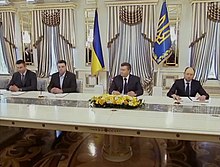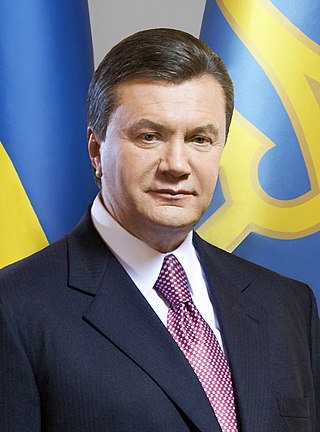
Viktor Fedorovych Yanukovych is a former Ukrainian politician, who was the fourth president of Ukraine from 2010 to 2014. He also served as the prime minister of Ukraine several times between 2002 and 2007 and was a member of the Verkhovna Rada from 2006 to 2010. A member of the pro-Russian Party of Regions, his removal from the presidency via revolution in 2014 led to the Russo-Ukrainian War. Since then, he has lived in exile in Russia.
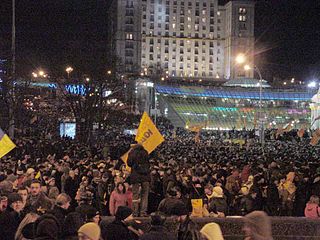
Below is the timeline of events that followed the runoff presidential election held in Ukraine on 21 November 2004 that sparked off the "Orange Revolution".

Yulia Volodymyrivna Tymoshenko is a Ukrainian politician, who served as Prime Minister of Ukraine in 2005, and again from 2007 until 2010; the first and only woman in Ukraine to hold that position. She has been a member of the Verkhovna Rada as People's Deputy of Ukraine several times between 1997 and 2007, and presently as of 2014, and was First Deputy Prime Minister of Ukraine for the fuel and energy complex from 1999 to 2001. She has the degree of Candidate of Economic Sciences.
The All-Ukrainian Union "Fatherland", referred to as Batkivshchyna, is a political party in Ukraine led by People's Deputy of Ukraine, former Ukrainian Prime Minister Yulia Tymoshenko. As the core party of the former Yulia Tymoshenko Bloc, Batkivshchyna has been represented in the Verkhovna Rada since Yulia Tymoshenko set up the parliamentary faction of the same name in March 1999. After the November 2011 banning of the participation of blocs of political parties in parliamentary elections, Batkivshchyna became a major force in Ukrainian politics independently.

Presidential elections were held in Ukraine on 17 January 2010. As no candidate received a majority of the vote, a run-off election was held between Prime Minister Yulia Tymoshenko and opposition leader Viktor Yanukovych on 7 February.

Arseniy Petrovych Yatsenyuk is a Ukrainian politician, economist and lawyer who served as Prime Minister of Ukraine twice – from 27 February 2014 to 27 November 2014 and from 27 November 2014 to 14 April 2016.

Arsen Borysovych Avakov is a Ukrainian statesman and politician of Armenian origin. Minister of Internal Affairs of Ukraine in 2014–2021. Member of Parliament of Ukraine (2012–2014), Chairman of the Kharkiv Regional State Administration (2005–2010), Member of the National Security and Defense Council of Ukraine, Member of Euro 2012 Organizing Committee (2007). Member of the National Union of Journalists of Ukraine. Honored Economist of Ukraine (2007).

The second Azarov government was the government of Ukraine from 24 December 2012 to 28 January 2014. It was dissolved amidst the Euromaidan protests. The ministers (except Prime Minister Mykola Azarov who was replaced by Deputy Prime Minister Serhiy Arbuzov, continued briefly as a caretaker government. On 27 February 2014 Ukraine's parliament approved a resolution to formally dismiss the government.

Euromaidan, or the Maidan Uprising, was a wave of demonstrations and civil unrest in Ukraine, which began on 21 November 2013 with large protests in Maidan Nezalezhnosti in Kyiv. The protests were sparked by President Viktor Yanukovych's sudden decision not to sign the European Union–Ukraine Association Agreement, instead choosing closer ties to Russia and the Eurasian Economic Union. Ukraine's parliament had overwhelmingly approved of finalizing the Agreement with the EU, but Russia had put pressure on Ukraine to reject it. The scope of the protests widened, with calls for the resignation of Yanukovych and the Azarov government. Protesters opposed what they saw as widespread government corruption, abuse of power, human rights violations, and the influence of oligarchs. Transparency International named Yanukovych as the top example of corruption in the world. The violent dispersal of protesters on 30 November caused further anger. Euromaidan led to the 2014 Revolution of Dignity.

Below are the foreign reactions to the Euromaidan. Euromaidan was a wave of demonstrations and civil unrest in Ukraine that began on the night of 21 November 2013 after the Ukrainian government suspended preparations for signing an Association Agreement and Deep and Comprehensive Free Trade Agreement with the European Union.
Below are the domestic responses to the Euromaidan. Euromaidan was a wave of demonstrations and civil unrest in Ukraine that began on the night of 21 November 2013 after the Ukrainian government suspended preparations for signing an Association Agreement and Deep and Comprehensive Free Trade Agreement with the European Union.
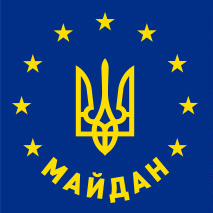
The Maidan People's Union is an alliance in Ukraine formed by several political parties and non-partisan individuals and public organizations on the fifth Sunday of the Euromaidan-protests with the aim of "building a new Ukraine and a new Ukrainian government" by creating a new Ukrainian constitution, and removing corrupt judges and prosecutors. It also aims to organize opposition to the current regime and to coordinate the protest movement in all regions of the country. In practice this means broadening support for the goals of the organization in the pro-government and pro-presidential heartland East Ukraine.

Tetiana Mykolaivna Chornovol is a Ukrainian journalist and civic activist, and one of the leaders in the Euromaidan protest campaign. She is known for investigative reports about corruption in Ukraine, as well as for her direct actions. In 2014, she was elected to the Verkhovna Rada.
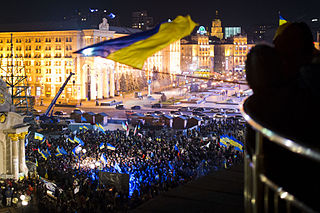
Euromaidan was a wave of demonstrations and civil unrest in Ukraine, which began on the night of 21 November 2013 with large public protests demanding closer European integration. Protesters also stated they joined because of the dispersal of protesters on 30 November and "a will to change life in Ukraine". The scope of the protests evolved over subsequent months, and by 25 January 2014 the protests were fueled by the perception of widespread government corruption, abuse of power, and violation of human rights in Ukraine. By February 2014 the protests had largely escalated into violence, resulting in the Revolution of Dignity and the resignation of Azarov's government and ousting of President Yanukovych. This resulted in the outbreak of the Russo-Ukrainian War.

Spilna Sprava is a political party in Ukraine registered on 19 March 2015, though active since late 2010. The name of the organisation, taken from Latin Res publica, indicates the republican nature of the movement, as well as symbolises the active civic solidarity of Ukrainians. It was founded in December 2010, during the Tax Maidan-2010 protests against the fiscal policies of Viktor Yanukovych.

Revival is a political party in Ukraine, established in its current form in June 2015. Its predecessor had been founded by Heorhiy Kirpa in 2004.
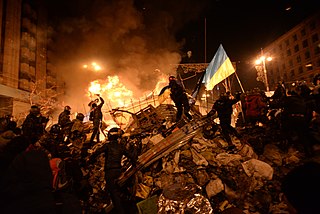
The Revolution of Dignity, also known as the Maidan Revolution or the Ukrainian Revolution, took place in Ukraine in February 2014 at the end of the Euromaidan protests, when deadly clashes between protesters and state forces in the capital Kyiv culminated in the ousting of elected President Viktor Yanukovych, the return to the 2004 Constitution of Ukraine, and the outbreak of the 2014 Russo-Ukrainian War.
The following lists events that happened in the year 2014 in Ukraine.
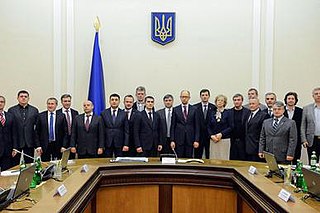
The first government headed by Arseniy Yatsenyuk was created in Ukraine on 27 February 2014 in the aftermath of the Revolution of Dignity. The cabinet was formed as a coalition of the Batkivschyna, UDAR and Svoboda political parties, the Economic Development and Sovereign European Ukraine parliamentary factions, and a number of unaffiliated MPs. On 24 July 2014, UDAR, Svoboda and 19 independent MPs exited the coalition to pave the way for the early parliamentary elections of late October 2014. Prime Minister Yatsenyuk announced his resignation the same day, but the Verkhovna Rada declined his resignation on 31 July 2014.

The anti-Maidan refers to a number of pro-Russian demonstrations in Ukraine in 2013 and 2014 that were directed against Euromaidan and later the new Ukrainian government. The initial participants were in favor of supporting the cabinet of the second Azarov government, President Viktor Yanukovych, and closer ties with Russia. By the time of the Revolution of Dignity in February 2014, the “anti-Maidan” movement had begun to decline, and after the overthrow of Yanukovych, the anti-Maidan fractured into various other groups, which partially overlapped. These ranged from people protesting against social ills, to supporters of a federalization of Ukraine, to pro-Russian separatists and nationalists.
